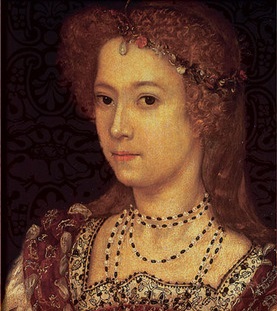As winter drew nigh, I passed many happy hours in Essex House.
 But I oft returned to my house in Black-Fryes [Blackfriars] lest our mistress should think I’d met with some mischance and offer my place to another.
But I oft returned to my house in Black-Fryes [Blackfriars] lest our mistress should think I’d met with some mischance and offer my place to another.
Great folks have more than one house. Why should not we cats?
So many ladies and gentlemen called at Essex House it were easy to slip in and out among the legs and petticoats.
There were cats and dogs there, too. All ears were pricked for what Her Majestie might command for their lord.
I told them I was in the honourable service of my lord of Southampton.
They warned me to take heed of what I sayt and to whom, for our enemies were everywhere.
My lord and Puss Fur-None had their own chambers in that house. I marvelled that my lord should have so many houses, yet needs must lodge there.
Sure, Puss Fur-None brought little to him but herself when they was wed.
My lord had forgot I’d dwelt in Titchfield. He scratched my head most civil, and arrkst me where I’d sprung from.
He sayt I had a fine white ruff, and that I was well-fed. Which I was, and ever more will be.
What things I heared in that house! Viz:
Essex was ill, troubled by the Irish looseness [dysentery]. Troubled by the Queen Puss looseness, more like.
Old Lady Walsing-Em had begged the Queen that Essex might write to her daughter the Lady Essex, new delivered of a she-brat. Queen Puss was in no haste to grant that favour.
Onlie one lady at Court stood firm for Essex, and she endured much from Queen Puss. May her name be praised! But I, without a tablet [notebook] on which to set down her name, have clean forgot it. This lady had served the Queen for many years and durst say more than most. And she dressed all in black, that others might know her thoughts.
Black is a colour of grief for men and women. (Their ways are strange.)

There was politick talk in Essex House, which the Pretty Penny loved as much as our mistress did. Though some say that’s not seemly in a woman.
But, as all know, the Pretty Penny has two husbands alive. That’s not seemly, neither. In a woman.
Many a queen cat would think shame to have onlie two. And we may be as politick as we choose.
Soldier-friends came to visit. They’d returned from Ireland, unwilling to remain without Essex. I learnt little from them that I did not know.
Then word of all the comings and goings at Essex House reached Queen Puss who’d left None-such and sat a-seething at White-Hall up the river.

To quiet things, Pretty Penny sayt she would go into the country for a few days. Puss Fur-None sayt she would go with her.
My Earl and I wished to stay in the citie. I returned to my own house, and he found other lodgings. Scabface, who kept the river wall, told me he’d heard my lord of Southampton was doing nowt but go to plays.
I knew my lord had been whispering with Sir Harry Daffers [Danvers] about what they might do if Essex were not soon freed. They would free him theirselves and help him flee the country!
I sayt nowt of this to Scabface.
Instead, I sayt I was joyed to hear my lord was going to plays. I hoped he would learn what a thief that player Snakes-Purr was.
In the 1590s the impecunious Earl of Southampton’s properties all seem to have been leased out. According to the letter-writer Rowland Whyte, the Earl and his wife Bess Vernon had a “house” (apartment) in Essex House for themselves and their “family” – which would include their servants.
The Old Lady Walsing-Em Tricks refers to is Ursula St-Barbe, the widow of Sir Francis Walsingham. He’d been one of Queen Elizabeth’s hardest-working and most capable administrators.
In October 1599, Rowland Whyte observed that the Earl of Southampton was going to see plays every day with the Earl of Rutland.
Roger Manners, 5th Earl of Rutland, had also been a ward in Lord Burghley’s household. In 1599 Southampton turned 26 and Rutland 23. Earlier that year, Rutland had married Elizabeth Sidney, the Earl of Essex’s stepdaughter. He then followed Essex to Ireland without the Queen’s permission. He was ordered home, and narrowly escaped imprisonment. With Essex in disgrace, both earls were at a loose end. The playhouses may also have been places where you could engage in whisperings without arousing suspicion.

Nice digs, indeed! And I imagine all that embroidered finery would make for some wonderful scratching. 🙂
LikeLiked by 2 people
It would. Plus there’s the joy of shinnying up the bedpost and sitting on the roof of the bed…
LikeLiked by 1 person
I’d like to think the earl was keeping out of trouble by going to plays, but I suspect that he was learning to be even more discontented.
LikeLiked by 1 person
I suspect the same. The lords’ box would have made a good spot for mutterings with fellow malcontents. To be fair, he did have much to be discontented about. Any young man who marries wisely but not well needs employment, and Queen Puss seems dead set against that.
LikeLiked by 1 person
There were probably always unhappy earls. I’m reading a biography of Edward II and his earls gave him a lot of bother.
LikeLike
I think keeping them loyal must have been THE challenge for medieval kings. By Elizabeth’s time their personal power bases had been weakened considerably. It’s been argued that the downfall of Essex and his band of brothers illustrates the changing role of the English nobility and the demise of chivalric culture.
I could easily get distracted by the Earl of Essex. I’m glad I’ve got shrewd Tricks and savvy Linkin to keep me on track.
LikeLiked by 1 person
There were very few who did it well. Edward III more or less made it his priority. He knew very well what would happen if he didn’t. His grandfather was quite good at it, but the rest of the Plantagenets seem to have been a bit rubbish.
I think Elizabeth did a very good job, especially since she couldn’t employ Edward III’s tactic of being a “man’s man”. Her spy network was a lot better than his, though.
LikeLiked by 1 person
It sounds like the ability to be the man among men was what it took.
Elizabeth played the game of the woman among men well, and ruthlessly – think of all the wives who weren’t welcome at court. But I don’t think her sex excuses her lacklustre pre-1588 Armada performance, and her post-Armada indifference to the fate of the men who’d served her so well. And I’m not sure how well she ever recognised that campaigns by land or sea often couldn’t go to plan regardless of the competence of commanders.
LikeLiked by 1 person
Yes, as wonderfully well-educated as she was, she probably didn’t learn much about the theory of warfare. I can’t imagine that she had much idea about the practical side, which would have been part of the upbringing of any well-born medieval man.
LikeLiked by 1 person
I wasn’t thinking so much of the theory of war but (for example) the effect of weather on the best-laid plans, and that of sickness and starvation on soldiers’ morale – particularly after they’d successfully defended her realm.
I’ve come to appreciate that she would have preferred to keep out of Europe’s wars, and make England a Protestant stronghold. That would have made it very difficult to manage noblemen and gentlemen who believed (not without self-interest) that taking the war to the aggressor was the strategically sensible (and more lucrative?) thing to do.
But I’ve also got the impression that she found it hard to refrain from attempting to micro-manage the front line. However, I’m very new to all this. I much preferred Elizabethan literature to Elizabethan history, so if I hadn’t stumbled onto the cats’ memoirs I wouldn’t have had to get my head around it in quite the way I have. And the cats never have a kind word to say about her, because she didn’t offer their Earl a good place in her household.
LikeLiked by 1 person
It is all tied up in the practical experience, isn’t it? If you’ve been brought up learning to fight on horseback, you know that rain is going to make things more difficult. You also know, or should know, that you depend on the soldiers who follow you.
Then you have the medieval problem of aristocratic men who have been trained to fight and who have now meaning, and no boots, unless they’re fighting.
I don’t know enough about Elizabeth to comment on her style of managing these things, but it was an area where she was at a real disadvantage, because she could never lead her troops into battle as other monarchs could.
LikeLiked by 1 person
Anybody brought up in a world where the horse is a prime mover, and good roads few, would know that rain makes things difficult! I suspect that Elizabeth may have lacked imagination – a lack that probably served as an advantage more often than not.
The historian Paul E. J. Hammer, in ‘Elizabeth’s Wars’, makes a similar point to yours re the disadvantage arising from not leading troops and being part of martial culture.
I suspect it also led to some of Elizabeth’s military leaders’ distrust for her “penmen”, who were suspected of not recognising, or even colluding in, frauds relating to military supplies.
LikeLiked by 1 person
I think I’d like to know more about Pretty Penny.
LikeLike
She sounds like a remarkable woman. I do hope Tricks manages to keep a close eye on her.
LikeLiked by 1 person
Our feral colony have many names and many houses. Recently there was a poster of Adolpho, our rangy tom cat in our cul de sac, asking if he belonged to someone. One of my neighbors called and found out he is called Bud, Tank and KATNISS (whaaaaat – he looks like he is wearing a leather jacket with a tattoo of Katniss…) in various streets within about 2 miles.
LikeLike
And I bet he spreads a lot of gossip as he flits around the town. He’d be the ideal boyfriend for Picker and Stealer.
LikeLiked by 2 people
Yeah, I think the girls round here rather like him… It is a bit like living in a feline 50 shades of gray!
LikeLiked by 2 people
Somehow I’m not surprised the Earl admired Trick’s ruff – a finer one than his own collection.
LikeLiked by 1 person
On the other hand, his hair was longer than hers…
LikeLiked by 2 people
Snakes-Purr is splendidly named. I am glad Tricks has a powerful ally in her quest fir revenge.
LikeLiked by 1 person
I think this may be wishful thinking on Tricks’ part. I’d still put my money on Picker and Stealer, and the low company they keep.
LikeLiked by 1 person